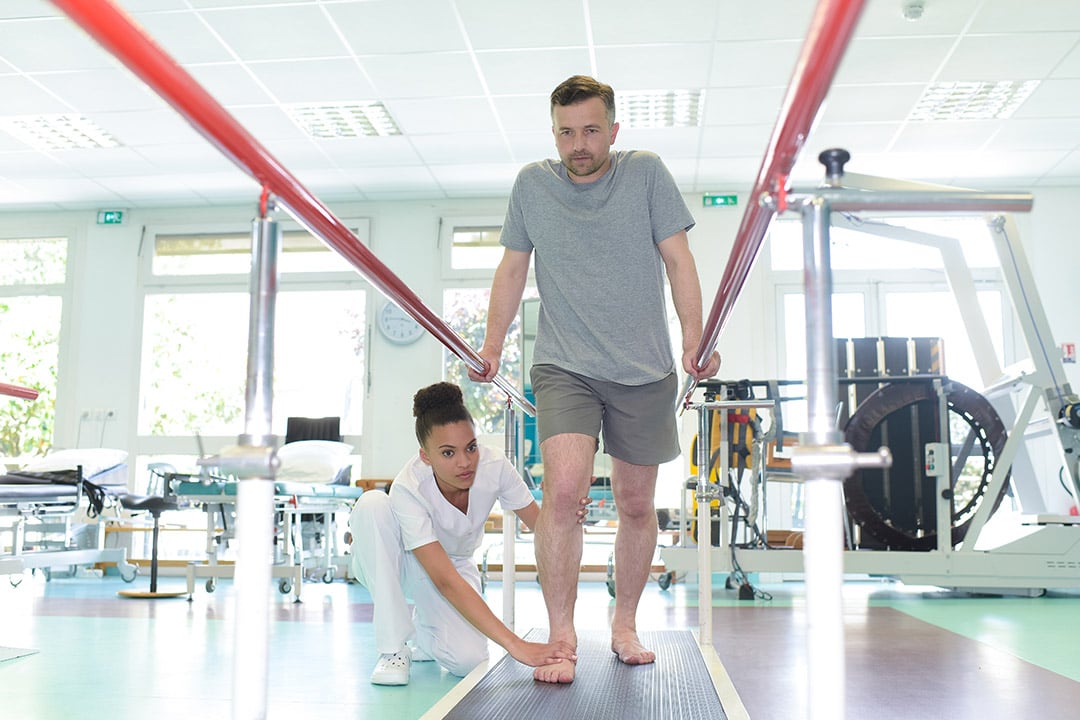
The neuromuscular system contains all the muscles in your body, and all the nerves that carry messages to those muscles. If you suffer from a neuromuscular condition, such as Parkinson’s Disease, Muscular Sclerosis (MS), or chronic pain triggered by compressed nerves, you may be referred for Neuromuscular Therapy, or NMT. In this article, we’ll explore what NMT is, and what makes it so beneficial for patients.
What is Neuromuscular Therapy?
Neuromuscular therapy is a form of rehabilitative treatment aimed at patients with neuromuscular issues. Helping patients to manage and reduce the symptoms of neuromuscular conditions is a long-term process. It requires a rehabilitation program that looks at the patient as a human being rather than a collection of symptoms. A holistic rehab program must address both the physical symptoms and the patient’s cognitive and emotional needs. Neuromuscular conditions can be severely debilitating and emotionally draining. Many of these conditions are progressive – meaning that they worsen over time. Therefore, the more that can be done to help these patients to manage the disorder and develop long-term coping strategies, the better.
At Rehab Select, we create customized, comprehensive rehabilitation programs for our patients. The components of neuromuscular therapy for patients with neuromuscular conditions may include:
- A complete swallow study
Some patients with neuromuscular disorders can have reduced throat and tongue mobility, which can impede their ability to swallow, talk, and eat. During a swallow study, patients swallow a liquid or solid food mixed with barium, a chemical that shows up on X-rays. The medical team will watch the X-ray via video to see how the patient’s throat and esophagus work when they swallow.
- Strength and range of motion exercises
As well as helping to reduce muscle rigidity and spasms with NMT, our team of rehab professionals will help you or your loved one improve your overall muscular strength and flexibility. We’ll also teach you exercises to increase your mobility, gait, and balance, to help you retain as much independence as possible. - Communication skills re-training
Many patients with neuromuscular disorders lose the ability to speak clearly. Our licensed speech therapists help patients improve their speech and find ways to communicate more clearly, even with impaired muscular mobility. - Psychological counseling and family support
Neuromuscular conditions can cause severe anxiety, stress, and depression. Additionally, some of these conditions can seriously impact cognitive function and brain chemistry – for instance, in the case of Parkinson’s, reduced dopamine production can cause major emotional issues. Therefore, a rehab program for neuromuscular disorders must include emotional support and counseling, both for the patient and for their loved ones and caregivers.
Who Can Benefit from NMT?
Any patient suffering from a neuromuscular disorder could benefit from NMT. Some of the most common conditions that are referred for NMT rehab include:
- Back pain;
- Trapped or compressed nerves;
- Carpal tunnel syndrome;
- Sciatica;
- Joint pain, such as knee pain, hip pain, and jaw pain;
- Plantar fasciitis and tendonitis.
However, NMT has also been shown to be highly effective as a treatment for patients with more serious neuromuscular disorders, such as Parkinson’s disease and Multiple Sclerosis (MS).
How Does NMT Help Patients with Multiple Sclerosis (MS)?
With multiple sclerosis, the nerve fibers of the brain, optic nerves, and spinal column, and the nerve coverings throughout the body (called myelin sheaths) are damaged. The disease usually attacks the nerves in waves and then goes into remission – although some people experience long-term or permanent MS flare-ups. The resulting nerve damage can cause severe physical and cognitive symptoms, including brain damage and issues with muscular responsiveness and coordination. People with MS may be unable to walk or balance or may lose the use of their arms or legs.
Physical therapy treatments that include stretching and strengthening exercise, balance training, gait training, posture re-education and other individualized neuromuscular re-education techniques can help significantly. This type of re-education of neuromuscular systems can be incorporated by physical and occupational therapists, leading to improvement in mood and body image as well.
Reaching for this goal is vitally important. At Rehab Select, we believe that the goal of patient care is to treat the challenges holistically, addressing patients’ physical needs and their cognitive and emotional needs as well. Our aim is to restore both maximum function and overall wellbeing.
What Makes NMT So Beneficial for Parkinson’s Patients?
Parkinson’s disease is a disorder of the brain, in which the nerve cells in the area of the brain that controls movement become increasingly impaired and die off. This atrophy results in characteristic shaking movements, as well as muscle stiffness, difficulty with walking, balance, and coordination. People with Parkinson's also suffer from non-movement symptoms, including fatigue, irregular blood pressure, digestive issues, depression, and sleep problems.
Neuromuscular therapy has been shown to be extremely helpful for managing the symptoms of Parkinson’s. Treatment techniques involve deep muscle stroking and squeezing, passive range of motion movements, and relaxation techniques to promote decreased muscle activity. In one study, NMT resulted in “a significant and sustained improvement” of symptoms, in particular, a reduction of tremors and an increase in muscular response times (measured by finger tapping.) Another case report found that NMT reduced muscular rigidity and pain in a 63-year patient with Stage 4 Parkinson’s disease.
Help Is Available
When you or your loved one is dealing with the symptoms of chronic disease, you’ll want to have an experienced team to help provide NMT. This critical component of managing the impact of neuromuscular conditions, including Parkinson’s and Multiple Sclerosis, is one of the many services offered at Rehab Select. If you’d like to learn more about neuromuscular therapy and how we can help patients manage the symptoms of neuromuscular conditions, please visit our website or click here to contact us.





